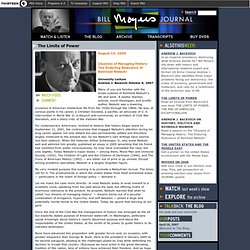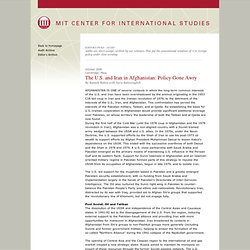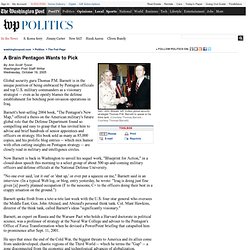

American Exceptionalism and US Foreign Policy - Foreign Policy Journal. By William Blum | September 19, 2014 The following is a talk given by William Blum at a teach-in on US foreign policy at the American University in Washington, DC, on September 6, 2014.

Each of you I’m sure has met many people who support American foreign policy, with whom you’ve argued and argued. You point out one horror after another, from Vietnam to Iraq. From god-awful bombings and invasions to violations of international law and torture. And nothing helps. Now why is that? The most basic of these basic beliefs, I think, is a deeply-held conviction that no matter what the United States does abroad, no matter how bad it may look, no matter what horror may result, the government of the United States means well. And Americans genuinely wonder why the rest of the world can’t see how benevolent and self-sacrificing America has been. This basic belief in America’s good intentions is often linked to “American exceptionalism”.
The future of US policy in Yemen - Inside Story Americas. Ali Abdullah Saleh, Yemen's outgoing president, has asked to come to the US.

Saleh has ruled Yemen for 33-years and Barack Obama, the US president, like his predecessor George Bush, regards him as a critical ally in the fight against al-Qaeda. But thousands of Yemenis have been protesting for months calling for Saleh to step down and hundreds have been killed by government security forces. In November, Saleh signed an agreement in Saudi Arabia, according to which he pledged to resign after next year's elections.
In return, he was promised immunity from prosecution for crimes such as the killing of protesters during his rule. But going forward, there are several issues for the US in Yemen. Firstly, there is the ongoing fight against al-Qaeda in the Arabian Penninsula (AQAP), which the US calls a great threat to American security. America's Truth Deficit. Bill Moyers Journal . Bill Moyers interviews Andrew J. Bacevich. Bill Moyers Journal . THE LIMITS OF POWER. August 15, 2008 Illusions of Managing History: The Enduring Relevance of Reinhold Niebuhr University Lecture Andrew J.

Bacevich October 9, 2007 Many of you are familiar with the broad outlines of Reinhold Niebuhr's life and work. A pastor, teacher, activist, moral theologian, and prolific author, Niebuhr was a towering presence in American intellectual life from the 1930s through the 1960s. For contemporary Americans, inclined to believe that history began anew on September 11, 2001, the controversies that engaged Niebuhr's attention during his long career appear not only distant but also permanently settled and therefore largely irrelevant to the present day. My very modest purpose this evening is to promote a Niebuhrian revival. Let me make the case more directly: to read Niebuhr today to avail oneself to a prophetic voice, speaking from the past about the past, but offering truths of enormous relevance to the present. From what perspective does Niebuhr speak to us? US & Iran in Afghanistan -Barnett Rubin.
Audits are short essays, written by our scholars, that put the conventional wisdoms of U.S. foreign policy under close scrutiny.

October 2008 Cambridge, Mass. The U.S. and Iran in Afghanistan: Policy Gone Awry By Barnett Rubin with Sara Batmanglich AFGHANISTAN IS ONE of several contexts in which the long-term common interests of the U.S. and Iran have been overshadowed by the animus originating in the 1953 CIA-led coup in Iran and the Iranian revolution of 1979, to the detriment of the interests of the U.S., Iran, and Afghanistan. During the first half of the Cold War (until the 1978 coup in Afghanistan and the 1979 revolution in Iran), Afghanistan was a non-aligned country with a Soviet-trained army wedged between the USSR and U.S. allies. The U.S. led support for the mujahidin based in Pakistan and a greatly enlarged Pakistani security establishment, with co-funding from Saudi Arabia and implementation largely in the hands of Pakistan's Directorate of Inter-Services Intelligence. A Brain Pentagon Wants to Pick.
Global security guru Thomas P.M.

Barnett is in the unique position of being embraced by Pentagon officials and top U.S. military commanders as a visionary strategist -- even as he openly blames the defense establishment for botching post-invasion operations in Iraq. Barnett's best-selling 2004 book, "The Pentagon's New Map," offered a thesis on the American military's future global role that the Defense Department found so compelling and easy to grasp that it has invited him to advise and brief hundreds of senior appointees and officers on strategy. His book sold as many as 85,000 copies, and his prolific blog entries -- which mix humor with often cutting insights on Pentagon strategy -- are closely read in military and intelligence circles. Now Barnett is back in Washington to unveil his sequel work, "Blueprint for Action," in a closed-door speech this morning to a select group of about 500 up-and-coming military officers and defense officials at the National Defense University.